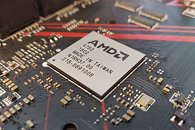Raevenlord
News Editor
- Joined
- Aug 12, 2016
- Messages
- 3,755 (1.20/day)
- Location
- Portugal
| System Name | The Ryzening |
|---|---|
| Processor | AMD Ryzen 9 5900X |
| Motherboard | MSI X570 MAG TOMAHAWK |
| Cooling | Lian Li Galahad 360mm AIO |
| Memory | 32 GB G.Skill Trident Z F4-3733 (4x 8 GB) |
| Video Card(s) | Gigabyte RTX 3070 Ti |
| Storage | Boot: Transcend MTE220S 2TB, Kintson A2000 1TB, Seagate Firewolf Pro 14 TB |
| Display(s) | Acer Nitro VG270UP (1440p 144 Hz IPS) |
| Case | Lian Li O11DX Dynamic White |
| Audio Device(s) | iFi Audio Zen DAC |
| Power Supply | Seasonic Focus+ 750 W |
| Mouse | Cooler Master Masterkeys Lite L |
| Keyboard | Cooler Master Masterkeys Lite L |
| Software | Windows 10 x64 |
We've known for some time that AMD's mainstream-segment B550 chipset wouldn't bring all the bangs and whistles of its bigger, enthusiast-class cousin X570. For one, it wouldn't make sense to increase development and implementation costs of both the chipset and motherboards built for mainstream enthusiasts by adding PCIe 4.0 support and the more stringent signaling and power requirements the new standard entails. As such, B550 reportedly cuts down fully on PCIe 4.0 support, as well as on the latest USB standards, to offer a product that's sufficiently rounded up on I/O while offering overclocking support for users that demand it.
Reportedly, AMD's B550 will only support up to 2x USB 3.2 Gen2 devices, 6x USB 2.0, 4 + 4 SATA3 connections, and the interlink between the chipset and the CPU occurs via a 4x PCIe 3.0 interface, which means there's less bandwidth for communication between the CPU and the chipset than on X570 - not that that was a real problem on AMD's previous-gen Ryzen products, though, so that's more of a technicality at this point. Ryzen 3000 CPUs still offer 4x PCIe 4.0 ports, though, so these could be used for speeding up a PCIe 4.0 NVMe SSD, for instance. The launch of B550-bound products is expected towards October.

View at TechPowerUp Main Site
Reportedly, AMD's B550 will only support up to 2x USB 3.2 Gen2 devices, 6x USB 2.0, 4 + 4 SATA3 connections, and the interlink between the chipset and the CPU occurs via a 4x PCIe 3.0 interface, which means there's less bandwidth for communication between the CPU and the chipset than on X570 - not that that was a real problem on AMD's previous-gen Ryzen products, though, so that's more of a technicality at this point. Ryzen 3000 CPUs still offer 4x PCIe 4.0 ports, though, so these could be used for speeding up a PCIe 4.0 NVMe SSD, for instance. The launch of B550-bound products is expected towards October.

View at TechPowerUp Main Site







